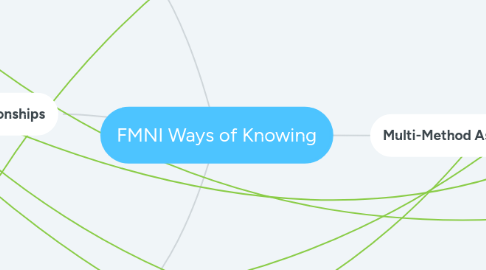
1. Aboriginal Traditional Learning
1.1. oral description and actual demonstration
1.2. holistic lifelong learning
1.3. experiential in nature
1.4. rooted in Aboriginal languages and cultures
1.5. representative mix of Aboriginal and Western knowledge
1.6. spiritually oriented
1.7. communal activity involving family and community of elders
2. Multi-Method Assessment
2.1. Sources of Data
2.1.1. teacher
2.1.1.1. expected to use many assessment tools
2.1.2. child
2.1.2.1. should influence their own education
2.1.2.2. should be involved with the evaluation of their own performance
2.1.3. peers
2.1.3.1. generate assessment for one another
2.1.3.2. values cooperation and non-competitiveness
2.1.4. talking circles
2.1.4.1. facilitate self- and peer assessment
2.1.4.2. builds trust and a sense of community
2.1.5. parents/elders/community
2.1.5.1. lifelong educators
2.1.5.2. creates unity between home and school
2.2. Assessment Methods
2.2.1. norm-referenced testing
2.2.1.1. needs to have ethical consideration and accountability
2.2.1.2. cultural biases need to be corrected or eliminated
2.2.2. observation-based evaluation
2.2.2.1. observe students in traditional experiential learning environments
2.2.3. rubrics and portfolios
2.2.3.1. alternative assessment tools
2.2.3.2. provide a richer and more fulfilling learning experience
2.3. Areas Assessed
2.3.1. cognitive
2.3.1.1. balance between Western and indigenous knowledge
2.3.1.2. integration of indigenous knowledge
2.3.2. spiritual
2.3.2.1. create cultural learning environment
2.3.2.2. assess growth in this complex area
2.3.3. emotional
2.3.3.1. must be nurtured and protected
2.3.3.2. helps to identify those in need
2.3.4. physical
2.3.4.1. nurture students physical well-being
3. Relationships
3.1. Classroom Environments
3.1.1. warm, caring, and welcoming
3.1.2. integrate Aboriginal teachings, cultures, and content
3.2. Personal
3.2.1. learning must be connected to personal values and life stories
4. Reflective Practice
4.1. Active Practice
4.1.1. engage learners with questions or problems
4.1.2. teacher becomes a facilitator
4.1.3. collaborative
4.2. Support Cultural Responsiveness
4.2.1. build on prior knowledge and experience
4.2.2. make connections to cultural ideas and experience
4.2.3. incorporate other sources of data
4.3. Instructional Strategies
4.3.1. incorporate various strategies to suit the needs of various learners
4.3.2. experiment with different teaching strategies

